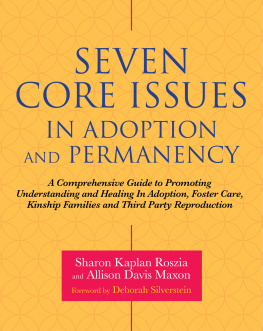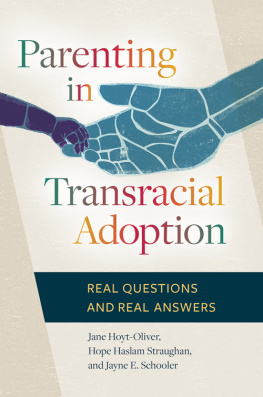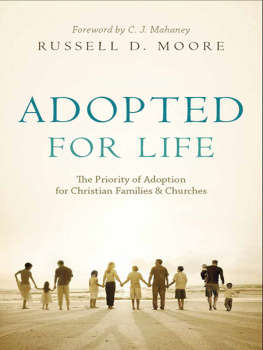Publication of this book was supported by funding
from Grand Valley State University.
2019 by the Board of Trustees
of the University of Illinois
All rights reserved
Library of Congress Cataloging-in-Publication Data
Names: McKee, Kimberly (Kimberly D.), author.
Title: Disrupting kinship: transnational politics of Korean adoption in the United States / Kimberly D. McKee.
Description: [Urbana, Illinois]: University of Illinois Press, [2019] | Series: The Asian American experience | Includes bibliographical references and index.
Identifiers: LCCN 2018032358| ISBN 9780252042287 (cloth : alk. paper) | ISBN 9780252084058 (pbk. : alk. paper)
Subjects: LCSH : Interracial adoptionUnited States. | Interracial adoptionKorea (South) | Intercountry adoptionUnited States. | Intercountry adoptionKorea (South) | AdopteesUnited States. | Korean AmericansEthnic identity.
Classification: LCC HV 875.64 . M 35 2019 | DDC 362.734089/957073dc23
LC record available at https://lccn.loc.gov/2018032358
Ebook ISBN 978-0-252-05112-8
Cover illustration: Hee Sook Kim, Paradise Between 4
2015. 50x50, Oil, acrylic, rhinestones on canvas
To my parents,
all of them
Acknowledgments
This book is for the hundreds of thousands of Koreans whose lives have been touched by adoption and to those adoptive families whose lives have been made richer as a result of the ruptures caused by adoption. The generosity of mentors, colleagues, and friends benefited this project. Their continual encouragement offered feedback and support when it was most needed.
My deepest thanks to Dawn Durante and the University of Illinois Press who believed in this project when it was in its earliest days as a book manuscript. I greatly appreciate the guidance Dawn provided as I revised this book over the last few years into what it is today. The anonymous reviewers offered valuable feedback.
The pages that follow reflect a decades-long journey growing out of my interest in exploring the gendered nature of Korean international adoption. This project first found its footing and focus with the support of Kimberly Springer. The origins of the book emerged with the generous support of Judy Tzu-Chun Wu and the feedback from Wendy Smooth, Lynn Itagaki, and Eleana J. Kim.
The Womens, Gender, and Sexuality Studies department and Asian American Studies program at The Ohio State University were formative spaces as I worked on this project. Thank you to those in the WGSS/History writing group with a special thank you to Adrienne Winans. Your critical eye and invaluable suggestions mean a lot. Graduate school would not have been the same without Denise A. Delgado, Sierra Austin, and Kate Livingston. My work on the transnational adoption industrial complex emerged in my course with Morgan Liu, and thank you to Shannon Winnubst, whose comments on adoptive families as queer kinship formations strengthened this project. Thank you to Martin Joseph Ponce and Jian Neo Chen whose work along with Lynn Itagaki and Judy Tzu-Chun Wu formed the core of my experience with the Asian American Studies program.
Research funding at the Ohio State University from the Asian American Studies program, Diversity and Identity Studies Collective, Office of Diversity and Inclusion, Council of Graduate Students, Arts and Humanities Graduate Research Small Grants, and G. Micheal Riley International Academic Fund in the College of Arts & Sciences supported the refining of arguments and analyses discussed in this project. Thank you to the Council of Graduate Students Edward F. Hayes Graduate Research Forum for recognizing the contributions of my arguments concerning adoptees racial, ethnic, and cultural identities. Funding from the Department of Womens, Gender, and Sexuality Studies Elizabeth D. Gee Award supported my visit to the University of Minnesotas Social Welfare History Archives. Thank you to Linnea Anderson for her assistance and guidance as I navigated the archives.
The community I formed at Grinnell College as a Consortium for Faculty Diversity postdoctoral fellow supported the drafting of the manuscript and book proposal. The mentoring from Carolyn Herbst-Lewis and friendship with other non-tenure-track junior faculty including Erin Cowling, Nabeela Alam, and Laura Burrack created a generative intellectual community. Special thanks go to Karla Erickson for providing feedback on my book proposal.
Thank you to my Asian American Studies family. I am indebted to Cathy Schlund-Vialss comments on my book proposal. This project benefited immensely from the East of California Junior Faculty retreat. Thank you to Nitasha Sharma and Min Hyoung Song for organizing the retreat in 2015 and Crystal Parikh and James Kyung-Jin Lee for leading my small group. Karen Leong has offered important advice over the years. As I finished this manuscript, the comments and suggestions from those at the American Studies Association Korea conferences in recent years strengthened my interventions concerning adoptee citizenship and cultural productions. Meaningful conversations with colleagues at the Association of Asian American Studies, American Studies Association, and National Womens Studies Association conferences provided feedback and encouragement as I presented portions of this manuscript. Special recognition also goes to the International Korean Adoptee Association Korean Adoption Studies Symposium and the Alliance for the Study of Adoption and Culture. And to Patricia P. Chu, thank you for sparking my interest in Asian American literature and the field of Asian American Studies when I was an undergraduate in your English courses.
Thank you to my colleagues at Grand Valley State University. A warm thank you to Melanie Shell-Weiss, who provided valued feedback on later versions of the manuscript. Additional thanks to Anne Hiskes, Wendy Burns-Ardolino, Sarah King, Marion Mathisen, and Courtney Sherwood. The support I have received from the Center for Scholarly and Creative Excellence cannot go unrecognized. Thank you for the countless mini-grants that allowed me to strengthen my manuscript, benefiting from the keen editing eye of Anna Genoese, as well as support from the Book Publication Subvention Fund. My gratitude to the Fred Meijer Center for Writing and their faculty writing retreatsthose spaces have been invaluable. Michelle Sanchezs attention to detail supported manuscript revision for clarity. Funding from the Pew Faculty Teaching and Learning Center facilitated generative conversations with colleagues at conferences.
Parts of this book have been previously published. Earlier versions of my discussion of the transnational adoption industrial complexs origins appeared in Monetary Flows and the Movements of Children: The Transnational Adoption Industrial Complex, Journal of Korean Studies 21, no. 1 (2016): 137178. Earlier versions of chapter three appeared in Real versus Fictive Kinship: Legitimating the Adoptive Family in Critical Kinship Studies , edited by Charlotte Krolkke, Lene Myong, Stine Wilum Adrian, and Tine Tjrnhj-Thomse (London: Rowman and Littlefield International, 2015), 221336. I am appreciative of the editors and external reviewers comments on these essays.







